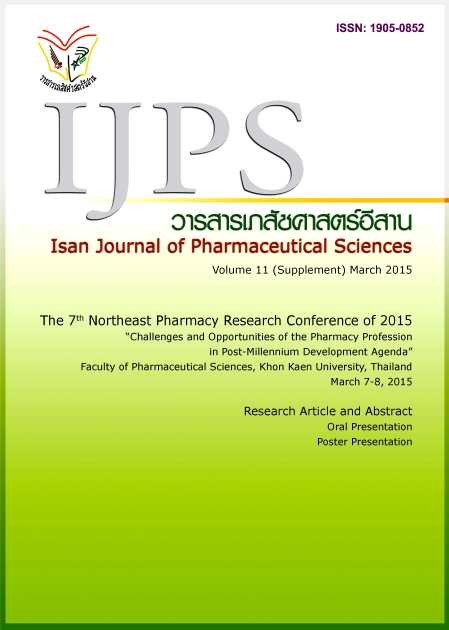Quantity and Expenditure of Non-Essential Drugs Use after the National Prescribing Restriction Policy in a Provincial Hospital
Main Article Content
Abstract
Introduction: Expenditure of Non-Essential Drugs (NEDs) in Civil Servant Medical Benefit Scheme (CSMBS) is rising. In 2011, the national prescribing restriction policy was announced to control drug expenditure due to use of expensive NEDs. This study aimed to determine quantity and expenditure of NEDs use after implementation of the policy in one provincial hospital. Methods: A retrospective study was conducted to analyze data on utilization and expenditure of 4 NEDs: HMG-CoA reductase inhibitors (Statins), Angiotensin II receptor blockers (ARBs), Proton Pump Inhibitors (PPIs) and COX-2 inhibitors (Cox2s) in CSMBS out-patients during 1 October 2009 to 30 September 2014 (fiscal year 2010-2014). Number of the patients, quantity and expenditure of NEDs use together with quality use of the medicines were extrapolated by medicine group and fiscal year. Results: During 2010-2014, number of the patients and quantity of NEDs used declined except for Statins. The expenditure of 4 NEDs decreased for 4.9 million baht (25.6%) where the highest reduction was found in Cox2s (54.3%). For quality use of medicine, the proportions of medical procession ratio over 1 in ARBs and Statins did not decrease but the proportion of Cox2s use over 30-day threshold declined. Furthermore, quantity and expenditure of essential drugs in the same categories of 4 NEDs increased. Conclusion: the national prescribing restriction policy has impact on quantity and expenditure of NED utilization. Future research should extensively assess impact of the policy on quality use of medicine.
Article Details
In the case that some parts are used by others The author must Confirm that obtaining permission to use some of the original authors. And must attach evidence That the permission has been included
References
Chaiyakunapruk N, Tanakornrungrod A, Cheewasitthi rungruang N, et al. Estimation of financial burden due to oversupply of medication for chronic disease. Asia Pac J Public Health. 2010:1-8
Dilokthornsakul P, Chaiyakunapruk N, Nimpitakpong P. Effects of Direct Billing System on Prescribing Patterns in the Civil Servant Medical Benefit Scheme. Journal of Health Systems Research. 2010:4 :53-62.
Health Insurance System Research Office. Reporting system for storage of the drug to evaluate the prescribing and analysis of feedback hospital. Nonthaburi. The Comptroller General’s Department .2012.
Health Insurance System Research Office. The result of the analysis of prescribing a prescription according to the indications given by the hospital in 34 pilot Comparison before and after implementation of the fiscal year 2009-2011. Nonthaburi. The Comptroller General’s Department. 2011.
Health Systems Research Institute. HSRI Forum: Moving forward to control the drug costs in Civil servant medical benefit Schemes. Journal of Health Systems Research. 2012:5(1).
Limpiyakorn K, Onsuk R, Civil Servant Medical Benefit Scheme. In: Sunthonthum S et al. Thailand health insurance system. National Health Security Office. Bangkok 2012.65-75
Limwattananon C, Thammatacharee N, Waleekhachonloet O, et al. Expenditure of Civil Servant Medical Benefit Scheme and the use of non-essential medicines. Journal of Health Systems Research. 2011:5(2) 149-159
Suanrueang P, Topark-ngarm A, Sakolchai S, et al. Measures for promoting rational use of high cost drugs in hospitals under Civil Servant Medical Benefit Scheme. Journal of Health Systems Research.2013: 7(2). 223-234.


